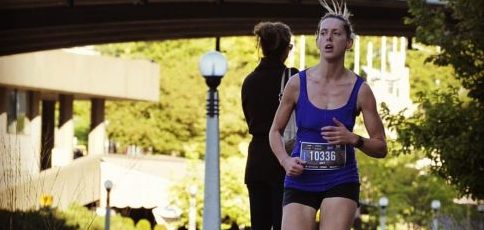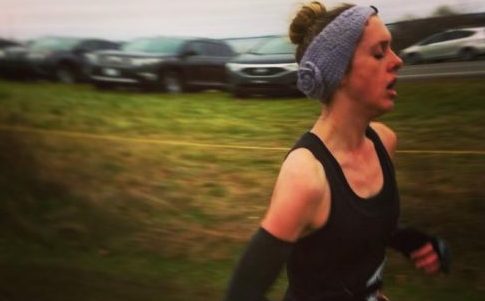Amy Friel is a contributor to iRun behind some of the most recent stories in our print edition. In our most recent issue, we celebrated some of the incredible women of Canadian running and thought you should know the one who brings those stories to life.
“What was your grandfather’s name?” I’m intrigued when Amy mentions that her grandfather won the 1978 Toronto Marathon.
“Jack Friel.”
“Like, THE Jack Friel?”
“Yes, THE Jack Friel,” Amy responds with a laugh.
I was semi-joking, but as one of the co-founders of Toronto’s Longboat Roadrunners, Jack Friel is something akin to the Romulus of the now sprawling empire that is the city’s running community.
Amy’s connections to running seem endless. Her parents met at a race that her father, now an accomplished masters runner, happened to win. Her sister was awarded a track scholarship to Georgia State where her roommate was Pan-Am medalist Rachel Hannah.

Given such connections and circumstances, one can say that running is simply “in Amy’s DNA,” or that from the start she had no choice but to lace up.
The fact is, however, that Amy’s relationship with running – how she came to it, what it means to her, why she does it – is entirely her own. She relishes that the sport is a family affair and that in April she will run the Boston Marathon alongside her father and sister, but the path to that coveted start line was hardly preordained and in reality is the culmination of a deeply vocational approach to running and Amy’s desire to test her own toughness and learn more about herself with each step.
“My dad actually quit running when he was 22 so he wasn’t doing it when I was a kid,” Amy recounts. “My grandfather had retired and I would see his trophies and awards, but I wasn’t really surrounded by people running and I was never pressured into it.”
It was Amy’s own decision to pursue Cross Country, which led to her first taste of the thrill that came from beating all the boys at her school’s track day. Amy would run until the age of 18, after which she would take a hiatus that would last five years and result in her only fight with her father.
The eventual return to running, initially a coping mechanism to deal with relationship and academic setbacks, is probably the true start of the journey that has led Amy to Boston and what informs her current understanding of the sport. “Even if it felt like everything was falling apart,” she says, “I was still able to run.”
Though she’s proven herself capable of thriving at a wide range of distances, it’s the marathon that holds a very special place in Amy’s heart, precisely because of its humbling nature. “No one runs every mile with someone else,” Amy reminds me. “In the marathon you will race and suffer alone.”

She notes that the very purpose of the distance is to take you to your breaking point and ask you to go a little further still. Amy says, “It’s supposed to feel like an impossible, insurmountable task. It’s about trying to plumb the depths of your own capacity. It demands that you’re humble enough to fail.”
It’s a “no guts, no glory” approach to running that makes it an inexhaustible pursuit – there are always depths to plumb – and one that I admire and identify with greatly. The results tell one part of the story, but no single result, no matter how impressive, marks the conclusion of the process or is the sole marker of success. The intangibles of growth, toughness of character, and honour derive from what you gave on the course and how you confronted the moments that demanded you to give more, both on and off the course.
This, I think, is Amy’s philosophy of running, which she confirms when she states that her paramount goal as a runner is to never quit in the moments of strife, especially in the midst of a bad race.
“Everyone has their rivals,” Amy contends, “and you kind of owe it to them to not quit because if you just drop out just because you’re not having your best day, you’ve cheated yourself and cheated them.”
For Amy herself, those teachings were put into practice after her first marathon in 2014, which she says she had absolutely no business running. Amy recounts, “I had no speed work in my training and was just wearing myself down with too much mileage.” It was her dad’s subsequent coaching that cut 24 minutes from that first marathon and brought Amy to Boston.
The experience of a disappointing first marathon is difficult to convey to those who have never been there, but to have such a long and gruelling training process that entails so much sacrifice culminate in yet more suffering and disappointment proves reason enough for many to leave it behind for good. It’s a sign that running maybe “just isn’t for them.”

Running doesn’t tell Amy what she is, however. Rather, she uses the sport to be what she wants to be with the same spirit of determination that made her a writer despite being laughed out of an interview for a job with a magazine years ago. Amy takes the lessons of running, but ultimately only she decides what she is and will be.
To talk to Amy is to have facts, trivia, and wisdom about running fly at you at a rate that’s difficult to keep pace with. My single favourite and the one that sticks most is when she tells me, almost in passing, that Tom Longboat’s Onandaga name, Cogwagee, means “everything,” and, “That’s what running is, it’s everything!”
For Amy, running is a passion, a family tradition, a subject for meticulous study, and a connection through which strangers become a community. She says, “When I moved to Toronto, I didn’t feel like I really lived here until I found the running community.”
These experiences have given way to the wisdom that running’s riches are far ranging and that through running, there are many things we can be and many joys in which to bask. The result is that Amy’s devotion to the sport is built upon a foundation of many pillars and unlikely to falter any time soon, even with experiences like that first marathon. “If you’re more than one thing,” Amy says, “you will never be broken by one thing.”
- Ravi Singh (@ravimatsingh)






 Current Issue
Current Issue Previous Issue
Previous Issue Prior Release
Prior Release
